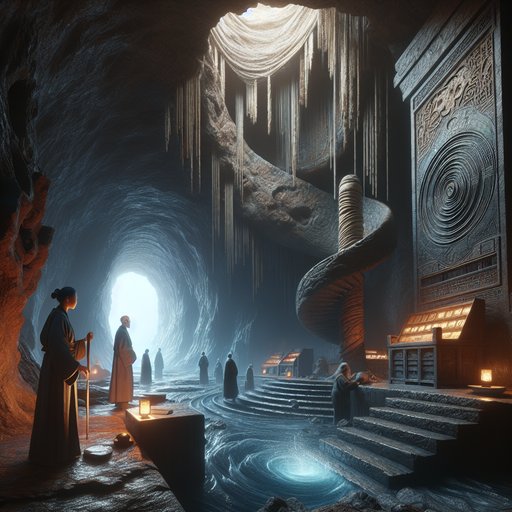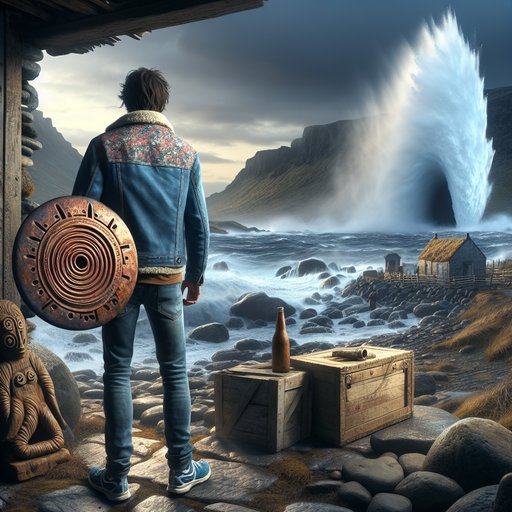CHAPTER 6 - The Second Secret Behind the Door of Winds

Inside the breathing fissure above Hadibu, Barbra plunges down a narrow stair as shadowy figures slip through the shuddering slit. They are not enemies but Keepers led by Samia’s uncle, who reveals that the copper disc is a decoy and the Monsoon Door is a layered secret: a song hidden inside noise, a door hidden inside a door. Salim admits his grandmother—the elderly market woman—began Barbra’s test with the amulet, and the false clues were meant to measure her integrity. The Keepers need her unfamiliar voice to close the aquifer gate before the khareef, protecting the inland water from salt. Guided by a bone tuning fork and dragon’s blood resin, Barbra helps realign the chamber’s breaths, opens a second panel with reversed notches, and glimpses records and a deeper passage that smells of incense. As an early storm surge throws the breathing mechanism out of sync, the cave trembles and the newly revealed door begins to groan open, threatening to flood. With wind and water building, the elder shouts that she must choose: secure the archive or seal the gate, leaving Barbra at a razor’s edge between discovery and disaster.
The shuddering crack squeezed my floral denim jacket and scraped chalky grit across my forearms as I pushed deeper, the stair cutting into my calves. My blue and white Asics scuffed on slick limestone steps shaped by centuries of wet breath, each irregular tread shimmering with mineral sheen. Behind me Salim’s low curse was swallowed by the rumble of the Door, a bass note like a living creature sleeping fitfully. Ahead, the air thickened, warm as skin, exhaling and inhaling in alternating pulses that matched the sea then faltered, an inland ghost synching to its twin.
I thought of my grandparents’ stoic patience, how they taught me to breathe through fear and keep walking when a room goes dark. The slit sighed and widened for a heartbeat, and two shadowy figures slid through with a whisper of rope on stone and the sweet sting of resin. A small lamp sniffed into life, wick blooming gold, and in its unsteady light I saw a lean man with salt at his temples and calm in his eyes. Samia—finally named as more than a warning voice—touched his sleeve as if claiming kin, her palm stained with red.
My freckles felt stark and childlike in that honeyed light, little constellations I still disliked even if no one else seemed to notice; at least my red hair was tamed in a braid that didn’t snag the rock. I had never needed makeup to face a tunnel anyway, just tight jeans, a tank top, and stubbornness that long walks had chiseled into muscle. We emerged in a chamber shaped like a lung, vaulted and honeycombed, two vents pulsing at different depths with breath that smelled of salt and limestone and wet leaf. My copper disc began to thrum in my hand, the spiral and three notches singing a faint harmonic that aligned with the sea’s exhale and then went shy.
I lifted the goatskin strip, thinking of the poem’s arrows and crescents, and aimed the disc at the nearest stone recess feathered with old red resin. The lean man stepped forward and caught my wrist with a pressure that did not feel like opposition; it felt like a stop taught on a mountain path. “Keys are for thieves,” he said in a voice weathered by wind and patience, “and that disc is a story we told to people who listen with their hands, not their heads.”
Samia’s eyes, the gray-green of a lagoon under cloud, flicked to Salim and then to me, an apology and a challenge tangled together. “We laid Detwah for you,” she said, chin lifting without pride, “because we needed to know if you would snatch or study, push or pause.” The resin there had been wrong on purpose; the scent tonight was true dragon’s blood, darker, iron-deep.
Salim’s jaw worked, then he said quietly, “My grandmother gave you the amulet because you helped her without thinking of gain. She is the market woman you lifted in the crowd.” I felt the shock like a door inside my chest opening and closing, a rush of old grief for parents lost to a road and gratitude for the grandparents who taught me to be steady when people turned out to be more complicated than I assumed. The elder—Samia’s uncle, she whispered—unwrapped a slender bone fork from cloth stained the same red as the resin and held it up between us. “We hide a door with another door,” he said, striking the fork gently against the wall so it hummed, “and a song with another song.” The note thrummed into my bones, a third breath joining sea and stone, a sweet unease that drew gooseflesh across my arms.
He placed the fork’s base against an unmarked panel where the spiral should have been and nodded at my throat. I hadn’t sung for anyone since childhood, but I matched the pitch like I match a path, hum steady, breath low. The panel shivered, a fine tremor, and a hairline seam ghosted into view, traced not with a spiral but with three notches reversed like footprints leading out instead of in. “The Door of Winds is not an entrance,” the uncle murmured, guiding my palm to an oiled depression warmed by countless Keepers, “it is a gate for water, shut before the khareef so salt does not walk inland.” He looked at Salim and Samia in turn.
“The sea must meet a strange voice to close completely. Family voices alone can lull it only so far.” The idea that my voice could be strange enough to seal a mountain made me want to laugh, except this was too solemn for laughter. I set my feet, feeling the tug in my calves, the grit biting the soles of my Asics like a reminder to stand my ground. My tank top clung with cave damp, and my floral jacket whispered against the stone when I lifted my shoulders and matched their chant, a thread of sound braided to theirs.
A panel eased inward with a sigh like a long exhale after pain, revealing copper studs set in weathered cedar and a small, round recess sealed with fresh dragon’s blood. The reversed notches winked from the seal, old and true; the three of us aligned our pieces without speaking—bone fork humming, my copper disc stilled, Salim pressing a thumbprint of family resin from a cloth pouch he had kept hidden. I caught my breath at the glimpse beyond: a cavity no larger than a basket, walls etched with tally lines and moon crescents, a slivered tablet of dark wood incised with characters like waves. The part of me that keeps a glass wall cabinet at home whispered greedless longing—I wanted to know it, not own it, to remember and tell.
I did not reach in, even when my fingers twitched; I let the elder slide the tablet into a cloth and tuck it away as if returning a sleeping child to bed. “Hold,” Samia said, head tilted, and a new shiver passed through the chamber, the sea’s breath sudden and impatient as the wind outside shouldered the island. The bass note of the inland aquifer lagged half a heartbeat, then a full one, and the harmony collapsed into uneasy dissonance that raised the hair on my arms. Water hissed somewhere below, a vent taking a breath too late and too long, as if the cave had hiccuped.
The lamp flame flattened and then spat, smoke stinging my eyes with resin and oil, and the elder’s calm cracked into focus sharp as a blade. “Khareef comes early,” he said, mouth set. “We must set the lock.”
We pressed resin into the reversed notches together, my thumb fitting the third depression as if the stone had always waited for that unfamiliar print, and the fork’s hum raised into a keening sweetness. My voice followed, throat raw now, and Samia’s steadied my pitch when it wavered with the stall and surge.
The copper studs rotated, a mechanical heartbeat aligning with ours, and a deeper groan announced something older stirring—a hinge that had not moved in a generation, perhaps. A second crack relented behind the first, and cold air breathed up through a narrow stair that plunged past the aquifer’s dark, smelling of incense and wet stone so ancient it felt like night itself. I saw, just for a breath, a glimmer like fish-light on an underground river, and lines of marks that could have been names or currents. “Now we choose,” the elder shouted over the rising rush, eyes on me with something like prayer and demand welded together.
“Seal the gate against the sea and leave the archive untouched, or follow the new breath to secure what must not drown—and risk everything.” The wind above moaned through Bab al-Riyah, the Door of Winds answering the deeper voice with a warning that rattled the cedar panel in its frame. My heart banged against my ribs, a frantic drum that felt like the island itself asking, and my palms stung with resin and chalk and decision. If I stepped toward that cold draft, would I be rescuing a century of secrets—or opening a flood that no song could close?
















































































